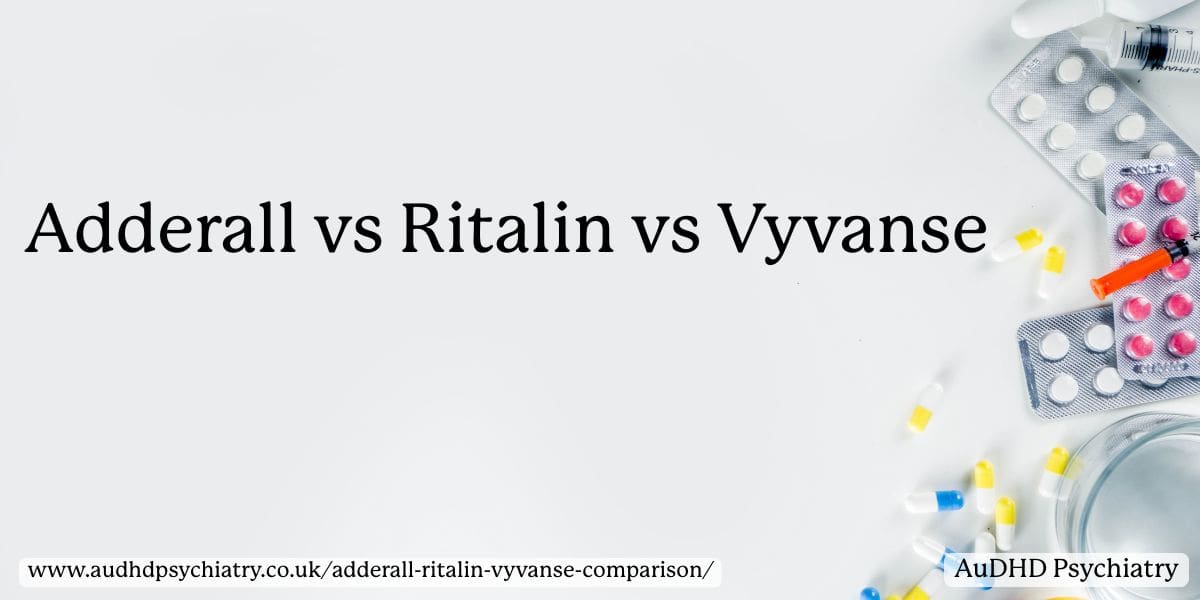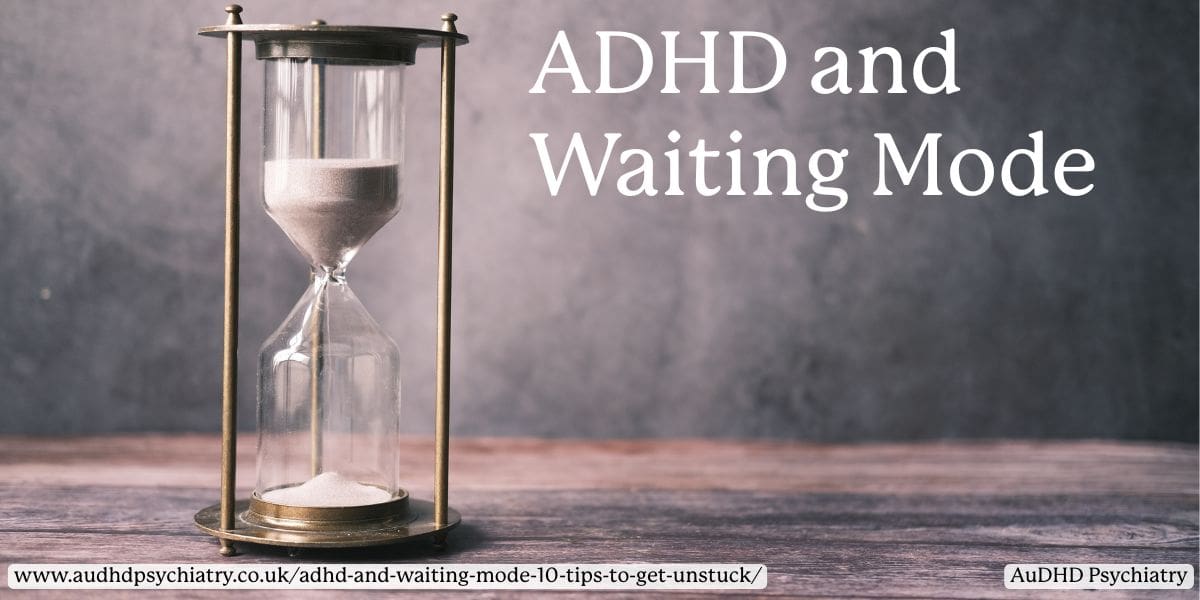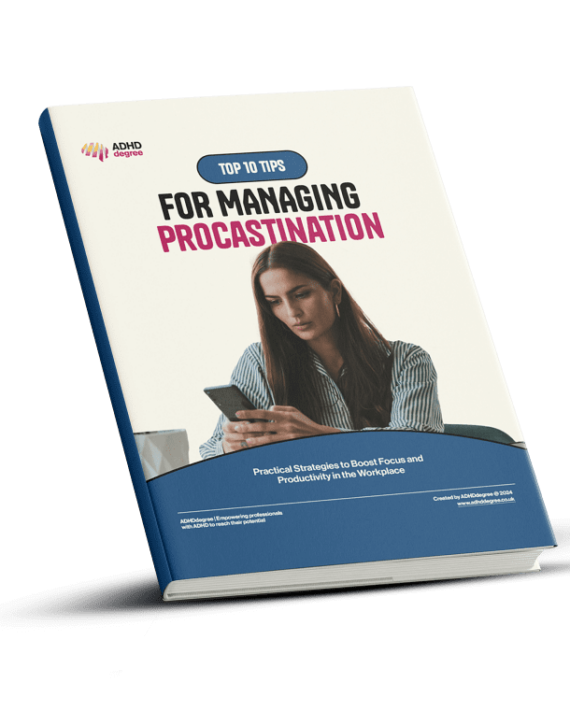Attention Deficit Hyperactivity Disorder (ADHD) is commonly treated with medication, particularly stimulant drugs such as Adderall, Ritalin, and Vyvanse / Elvanse. While Adderall is not currently licensed to be prescribed in the UK, its therapeutic role is often fulfilled by Elvanse or, in some cases, dexamfetamine. These medications all belong to a class known as central nervous system stimulants and are widely prescribed to both children and adults diagnosed with ADHD.
However, despite their similar purposes, they differ in formulation, active ingredients, effectiveness, duration, and side effects. This article provides a detailed comparison of Adderall, Ritalin, and Vyvanse to help you understand the key differences and make informed decisions about treatment options. This ADHD medication comparison highlights differences in how these stimulants work, their suitability for different age groups, and how they are prescribed in the UK.
Overview of ADHD
Though ADD and ADHD are terms often used interchangeably, ADHD is the current medical diagnosis encompassing several types of attention-related disorders. ADD (Attention Deficit Disorder) is an outdated term that typically refers to the inattentive type of ADHD. According to the NHS, ADHD symptoms can include inattentiveness, hyperactivity, and impulsiveness, though not everyone experiences all three.
There are three main types of ADHD:
- Inattentive (historically referred to as ADD)
- Hyperactive-impulsive
- Combined type
In the UK, ADHD is diagnosed according to criteria outlined in the DSM-5 or ICD-10, depending on the healthcare provider. Common symptoms in adults include disorganisation, poor time management, and difficulty sustaining attention. In children, signs may include excessive fidgeting, interrupting others, and academic struggles.
If you or a loved one is looking for information on how to get tested for neurodivergence, we broke down all you need to know in this guide.
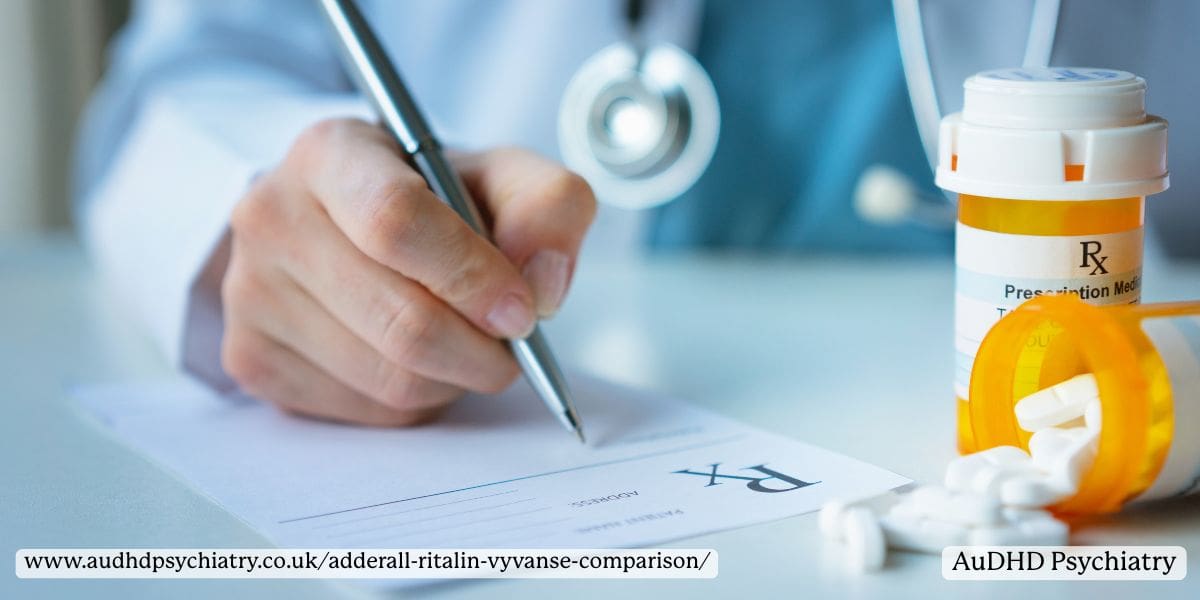
How Do ADHD Medications Work?
ADHD medications target specific neurotransmitters in the brain, mainly dopamine and norepinephrine, to improve focus, impulse control, and emotional regulation. There are two major categories: stimulant medications and non-stimulant options.
Stimulants vs Non-Stimulants
Stimulant medications are the most commonly prescribed treatment for ADHD. They include amphetamines (e.g., Adderall, Vyvanse/Elvanse) and methylphenidates (e.g., Ritalin, Concerta). These drugs act as central nervous system stimulants, increasing dopamine and norepinephrine availability in the brain. They are typically classified as Schedule II controlled substances in the UK due to their high potential for misuse and dependency.
In the UK, the only non-stimulant ADHD medication licensed by the MHRA is atomoxetine (Strattera). Other medications like guanfacine (Intuniv) may be used, but not all formulations or brands are routinely prescribed under the NHS. These are often prescribed when stimulants are ineffective or cause undesirable side effects. Though non-stimulants may take longer to show benefits, they offer a lower risk of abuse and are not classified as controlled substances.
How Stimulants Treat ADHD
Stimulants like Adderall and Ritalin help regulate attention and behaviour by enhancing the brain’s signalling pathways. Adderall contains amphetamine salts, while Ritalin uses methylphenidate as the active ingredient. Vyvanse, a prodrug of lisdexamfetamine dimesylate, is converted into its active form in the body and offers a smoother onset with longer-lasting effects.
Stimulants are available in both immediate-release and extended-release forms. Immediate-release tablets work quickly but wear off within a few hours. Extended-release forms (e.g., Adderall XR, Concerta) provide symptom control throughout the day and may improve compliance.

Non-Medication Approaches to ADHD
While medication is often a first-line treatment, many individuals benefit from a multimodal approach. Behavioural therapy, parent training, and psychosocial interventions can support emotional regulation and executive functioning. Sleep hygiene, regular physical activity, and dietary modifications also play a role in symptom management. Some patients may explore alternative treatments such as mindfulness or occupational therapy, though these should complement rather than replace medical guidance.
Need more resources and tools to help manage ADHD? We listed 17 Must-Have ADHD Resources in our blog.
Stimulant Medications for ADHD
Adderall: Amphetamine Mixed Salts Currently Not Licensed in the UK
Adderall is a mixed amphetamine salt formulation frequently prescribed in the United States to treat ADHD. However, it is not currently licensed for use in the UK. That said, individuals often encounter references to Adderall online or when researching ADHD medications, which is why understanding its role is still helpful.
In the UK, the closest alternatives are:
- Elvanse (lisdexamfetamine) – a long-acting prodrug of dexamfetamine available on the NHS
- Dexamfetamine – a short-acting amphetamine stimulant available in the UK, prescribed when methylphenidate and lisdexamfetamine are not suitable or well tolerated
These alternatives target similar neurotransmitter systems, dopamine and norepinephrine, and are classified as Schedule II controlled substances due to their stimulant nature. Side effects associated with this class may include insomnia, appetite suppression, increased heart rate, and anxiety.
Vyvanse (Lisdexamfetamine Dimesylate) / Elvanse in the UK
Vyvanse, or Elvanse in the UK, is a long-acting stimulant that must be metabolised in the body to become active, making it less likely to be abused. It provides a gradual release of effects and is often praised for its smoother performance curve, reducing the risk of rebound symptoms and emotional crashes.
Vyvanse is licensed for use in both children and adults with ADHD in the UK and is also used off-label for binge eating disorder. It’s also a first-line treatment under NICE guidelines. Side effects include nausea, irritability, and potential weight loss. It is not ideal for those requiring flexible dosing or fast onset of action.
Ritalin (Methylphenidate)
Ritalin is one of the oldest and most studied ADHD medications. It acts quickly, usually within 30 minutes, and is available in short-acting and long-acting forms. Ritalin LA offers extended symptom coverage for school or workdays.
Its side effect profile is similar to other stimulants: nervousness, loss of appetite, and potential for increased blood pressure. Ritalin may be a good starting point for individuals new to medication, especially in children.
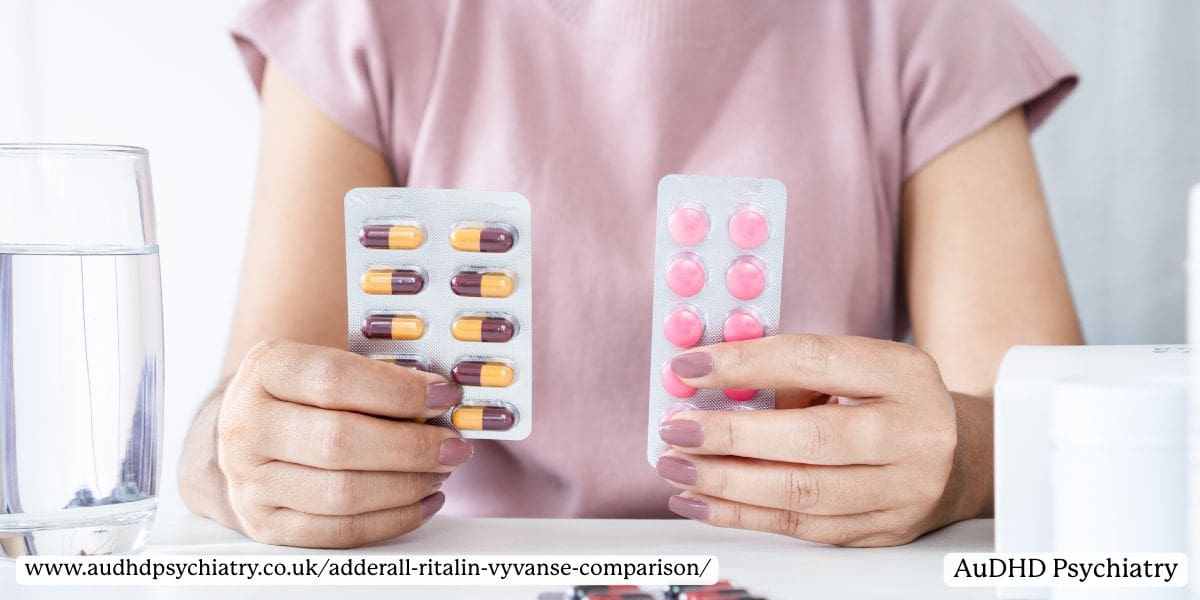
Adderall vs Ritalin vs Vyvanse: Which ADHD Medication Is Best?
The question of the best ADHD medication for adults or children depends on several factors, including medical history, lifestyle, and individual response. Each person’s response to medication can vary based on body chemistry, lifestyle, and any co-occurring conditions. For example:
- Adderall, though unavailable in the UK, is pharmacologically similar to dexamfetamine, a short-acting amphetamine stimulant which, according to NICE guidelines, may be considered for adults whose ADHD symptoms respond to lisdexamfetamine but who cannot tolerate its longer effect profile.
- Ritalin works quickly and wears off sooner, making it suitable for short-term needs or trial use.
- Vyvanse (Elvanse) offers long-lasting, stable coverage and is associated with a lower risk of misuse.
The choice should always be made in consultation with a healthcare provider, who can monitor response and adjust the treatment plan accordingly. You can also book a private ADHD assessment to explore your options further.
Adderall vs Ritalin vs Vyvanse: Which ADHD Medication Is Best?
Choosing between Adderall, Ritalin, vs Vyvanse depends on several factors: symptom profile, dosing needs, side effect tolerance, and daily routine. Ritalin and Vyvanse (Elvanse) are the two most commonly prescribed stimulant medications for ADHD.
While Adderall is not licensed for use in the UK, it remains a widely referenced treatment due to its prevalence in the US. Understanding how it compares can help contextualise the medications available here. We’ve previously mentioned Elvanse and dexamfetamine as Adderall alternatives here.
Dexamfetamine is licensed for use in children aged 6–17 years with ADHD when response to methylphenidate is inadequate; its use in adults is off-label. Nonetheless, clinical practice often includes its prescription for adults who respond to lisdexamfetamine but cannot tolerate its longer duration of action.
These are all stimulant medications, but they differ in active ingredients, duration of action, and how the body processes them.
- Adderall, though unavailable in the UK, is pharmacologically similar to dexamfetamine, which can be prescribed in certain cases by specialists. It can help improve focus, attention, and impulse control.
- Ritalin, based on methylphenidate, has a shorter half-life and is often used in school settings due to its quick onset.
- Vyvanse, a long-acting amphetamine-based stimulant, is metabolised more gradually, offering a consistent effect and reduced abuse potential.
In terms of side effects, each medication may cause appetite loss, insomnia, increased heart rate, or anxiety, but individual reactions vary. Vyvanse is often preferred for its smooth onset and lower likelihood of causing mood crashes, while Ritalin offers flexibility for short-term symptom control.
When comparing popularity, all three are widely prescribed, but in the UK, Vyvanse (Elvanse) and Concerta are often recommended as first-line options under NICE guidelines. There’s no one-size-fits-all solution. The “best” medication depends on how your body responds, your routine, and medical advice from a clinician.
Vyvanse vs Adderall: Key Differences
Though both medications are amphetamine-based, Vyvanse and Adderall differ significantly in formulation, delivery, and effect profile. For those comparing treatments internationally or coming across US-based sources, this breakdown explains their differences and the UK equivalents.
What Are Vyvanse and Adderall?
- Adderall combines four amphetamine salts, acting quickly and powerfully to reduce core ADHD symptoms. Dexamfetamine is available in immediate-release form and shares a similar mechanism of action but may require multiple daily doses per day.
- Vyvanse contains lisdexamfetamine dimesylate, a prodrug that only becomes active after digestion, resulting in a slower, steadier onset.
Dosage and Forms
Adderall is available in immediate-release tablets (lasting ~4 hours) and extended-release capsules (lasting up to 12 hours), while dexamfetamine is short-acting, lasting around 4-6 hours and often taken 2-3 times per day, with specific dosages prescribed by a healthcare provider. Vyvanse / Elvanse comes in a long-acting formulation, typically lasting 10–14 hours, and is available as capsules or chewable tablets.
Collaborate with your clinician as they will prescribe the proper dosage for you. For more information on working on your dosage, read our guide: Is My ADHD Medication Dosage Right? (Too High vs Too Low)
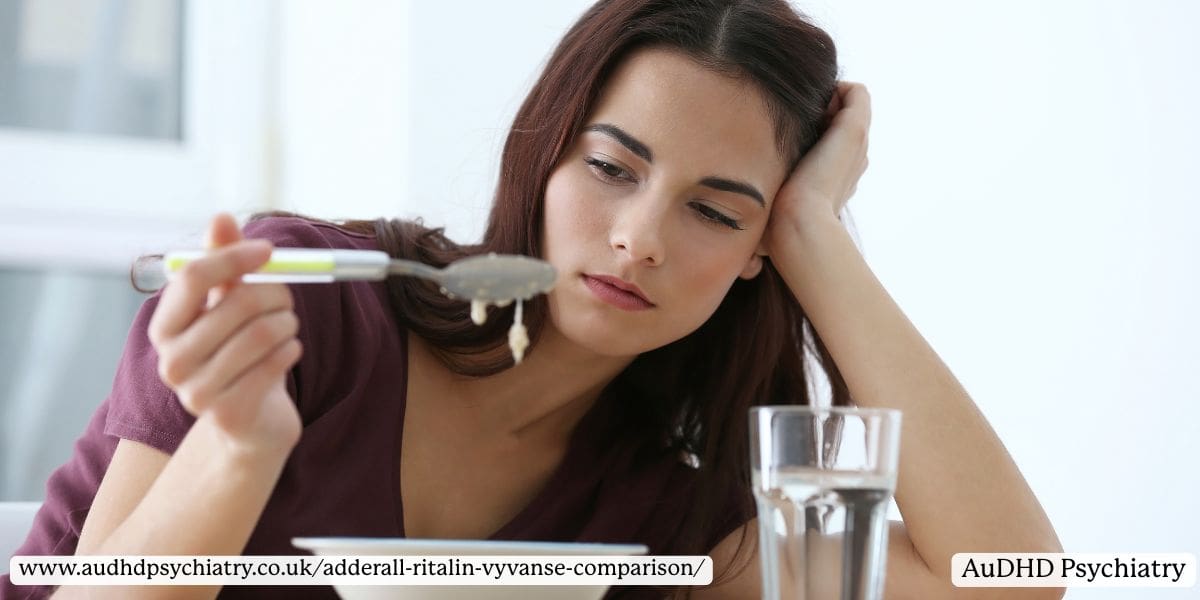
Side Effects and Tolerability
While some view medications like Adderall as the strongest ADHD medication due to their fast-acting effects, this and other stimulants can also increase the risk of crashes or side effects. Adderall, Vyvanse / Elvanse, and dexamfetamine can lead to appetite suppression, elevated heart rate, sleep disturbance, and anxiety. However, Vyvanse’s gradual activation may reduce crashes or rebound symptoms, making it more tolerable for some.
Cost and Coverage
In the UK, these medications are available through private prescriptions. Elvanse is more commonly prescribed via the NHS. As we’ve previously shared, Adderall is not currently prescribed here.
Potential Abuse Risk
Stimulant medications can carry a risk of misuse, particularly those with a faster onset and shorter duration, such as dexamfetamine, which is occasionally prescribed in the UK when other options are ineffective. Its immediate-release format allows for quick symptom relief, but may also increase its abuse potential, especially in individuals with a history of substance misuse.
By contrast, Elvanse s a prodrug, meaning it must be metabolised by the body to become active. This mechanism delays the onset and reduces the likelihood of misuse, making it a preferred choice for those at risk of drug abuse or in need of more controlled symptom management.
Onset Time and Duration
How long does Vyvanse last? On average, it takes 1–2 hours to activate fully, and it provides symptom control for 10 to 14 hours, making it a long-acting option suitable for all-day coverage.
Adderall acts faster but may result in peaks and troughs depending on the release format. dexamfetamine, on the other hand, has a faster onset, often within 30 to 60 minutes, and typically lasts 4 to 6 hours per dose. It may need to be taken multiple times a day to maintain symptom control, which can be beneficial for those needing flexible or time-specific relief.
Interactions and Warnings
These medications can interact with monoamine oxidase inhibitors (MAOIs), antidepressants, and other central nervous system stimulants. They should be used with caution in individuals with:
- high blood pressure
- heart conditions
- a history of mental health disorders
Patients receiving any ADHD medication in the UK should be regularly monitored by their prescriber for cardiovascular health, psychological wellbeing, and potential drug interactions, whether the treatment is through the NHS or a private provider.
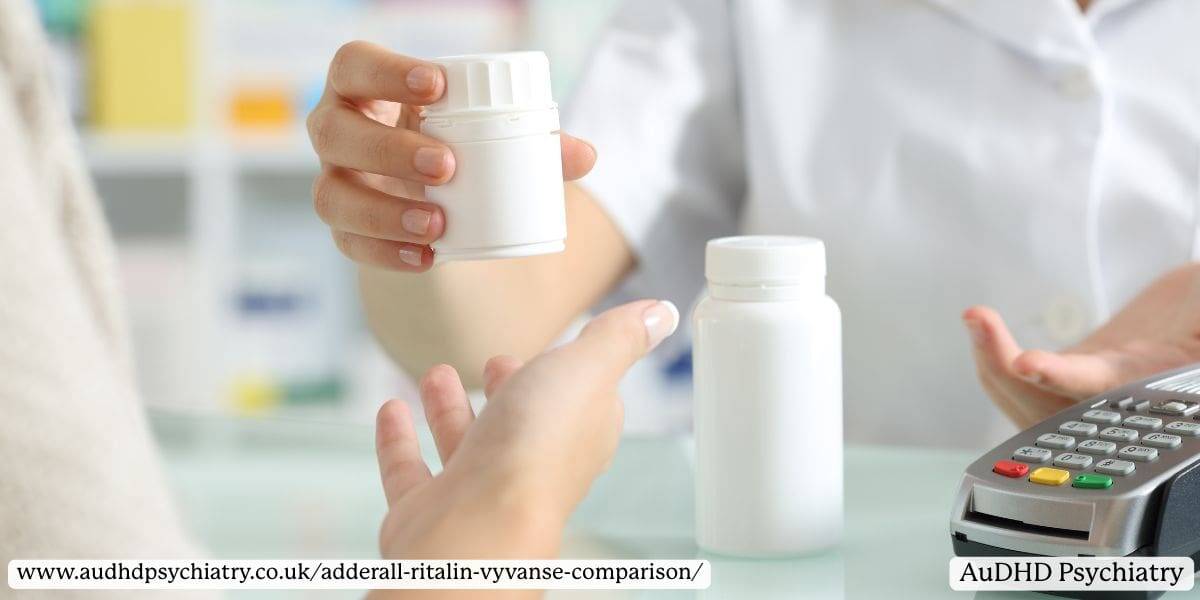
Vyvanse vs Ritalin: How They Compare
Though both target similar brain pathways, Vyvanse and Ritalin differ in active ingredients, release methods, and effect duration.
Uses and Effectiveness
Both are prescribed for managing attention deficit hyperactivity disorder, especially in school-age children, adolescents, and adults. Vyvanse may be more suitable for individuals needing all-day symptom coverage. Ritalin is often chosen for its flexibility, ideal for shorter periods of focus, such as during school hours.
Dosage, Onset Time, and Duration
- Ritalin has a quick onset (20–30 minutes) and shorter duration (3–4 hours for IR; 6–8 hours for Ritalin LA).
- Vyvanse takes longer to kick in (60–90 minutes) but lasts up to 14 hours.
For those sensitive to medication changes or needing evening coverage, Vyvanse may offer a more stable option. Ritalin allows for precise dose titration and may suit those who want minimal late-day impact on sleep or appetite.
Side Effects and Health Considerations
Shared side effects include appetite loss, irritability, nausea, and sleep disturbance. Ritalin can sometimes cause rebound symptoms as it wears off. Vyvanse, due to its prodrug design, often avoids this, though it may still cause weight loss or insomnia.
Those with cardiovascular conditions, bipolar disorder, or a history of mental health issues should discuss risks with their healthcare provider before starting either.
Adderall vs Ritalin: Efficacy, Side Effects, and More
Adderall (with dexamfetamine as one of the Adderall alternatives for UK patients) and Ritalin are two of the most established ADHD medications on the market. Both are classified as central nervous system stimulants, but they differ in chemical structure, onset time, duration, and potential side effects.
Efficacy and Dosing Differences
Both methylphenidate (used in Ritalin and Concerta) and amphetamines (used in Adderall and dexamfetamine) work by increasing dopamine and norepinephrine activity in the brain. These neurotransmitters play a role in attention, motivation, and impulse control.
Dosing is typically personalised. Adderall is available in immediate-release and extended-release forms, while Ritalin is available as immediate-release, Ritalin LA, and Concerta for longer coverage. Depending on the individual’s routine and treatment goals, a short-acting dexamfetamine may be taken multiple times daily.
As with all ADHD medications, personal response varies. Some individuals may respond better to methylphenidate-based treatments like Ritalin, while others benefit more from amphetamine-based medications like dexamfetamine or Elvanse.
What Are the Side Effects of These Medications?
All stimulant medications come with a potential for side effects, though severity and frequency vary by individual and dosage. The most common issues include appetite suppression, difficulty sleeping, headaches, dry mouth, increased heart rate, and nervousness.
Common and Potential Side Effects
Side effects can differ slightly between amphetamine-based and methylphenidate-based stimulants. Adderall and Vyvanse, for example, may be more likely to cause insomnia and anxiety, while Ritalin and Concerta may trigger stomach upset or irritability.
Less common but serious side effects can include:
- High blood pressure
- Chest pain
- Mood swings
- Tics or tremors
- Worsening of anxiety or depression
- Rarely, sudden cardiac events in at-risk individuals
Special Considerations
- Rebound symptoms: Particularly seen in short-acting medications like Ritalin when the effects wear off.
- Serotonin syndrome: May occur when stimulants interact with other medications like SSRIs.
- Sleep issues: Some medications like Jornay PM or non-stimulants are preferred for individuals who experience evening stimulation.
dexamfetamine, being shorter-acting, can also result in more noticeable peaks and troughs, which may affect mood or concentration later in the day. It’s crucial to monitor any adverse effects closely and report them to your healthcare provider, especially in children or those with co-existing medical conditions.
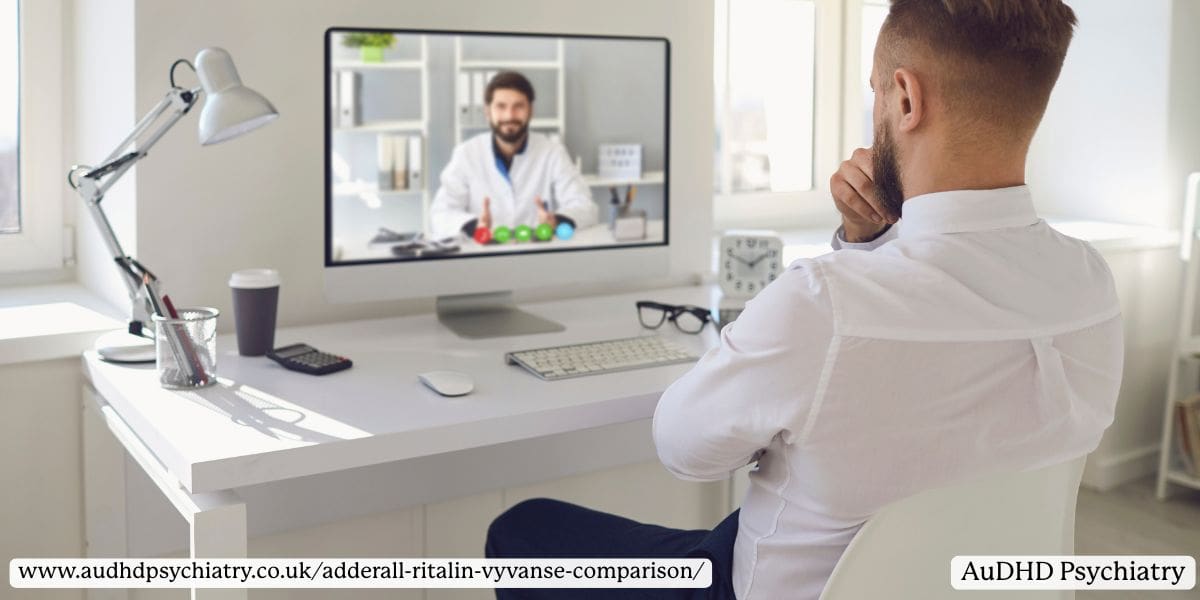
Choosing the Right ADHD Medication for You
With so many options available, finding the right ADHD medication involves more than simply picking the widely used ones. Factors such as personal medical history, side effect profile, daily schedule, and even treatment goals are also taken into account.
Factors to Consider
- Type of ADHD (inattentive, hyperactive-impulsive, or combined)
- Duration of coverage needed (e.g. short school days vs full-time work schedules)
- Tolerability: Some may experience more appetite loss or sleep disruption than others
- Co-existing conditions: For example, anxiety, depression, tics, or heart issues
- Delivery method: Tablets, capsules, chewables, patches, or liquid forms
- Age and lifestyle: Younger children may do better on short-acting stimulants or lower doses
Some individuals prefer non-stimulant options, such as Strattera, Intuniv, or others, especially if there’s a history of side effects or concern around abuse potential. Ultimately, deciding which medication is right should involve consultation with a medical doctor, whether through the NHS or a private assessment.
Switching ADHD Medications Safely
Switching from one ADHD medication to another isn’t unusual, particularly if side effects are hard to manage or the current option is no longer effective. Whether you’re moving from Ritalin to Vyvanse, adjusting dosages, or trying a different class of medication, the process should always be managed under the guidance of a medical doctor.
When to Consider Switching
- Persistent or severe side effects such as anxiety, sleep disturbance, or appetite loss
- Medication wearing off too quickly or rebound symptoms in the evening
- Inadequate symptom control despite dose adjustments
- Need for longer coverage or a different delivery method
What to Expect
A transition plan usually involves:
- Tapering down the current medication
- Washout period (in some cases) to avoid interaction or overdose
- Introduction of the new medication at a lower dose
- Close monitoring of side effects and symptom changes
You may also be advised to keep a symptom diary to track changes in focus, mood, sleep, and physical effects. Certain combinations (e.g. stimulants with monoamine oxidase inhibitors) must be avoided due to the risk of serious interactions. Individuals with a complex medical history or other psychiatric diagnoses should take extra care.
ADHD Medication Guidelines in the UK: Ages, Schedules, and Access
Who Can Be Prescribed ADHD Medication in the UK?
In the UK, ADHD diagnosis and treatment follow NICE guidelines and are regulated by the MHRA (Medicines and Healthcare products Regulatory Agency). Most stimulant medications, including methylphenidate (e.g. Ritalin, Concerta XL) and lisdexamfetamine (Elvanse), are licensed for use in children aged 6 and over. However, eligibility and prescribing decisions vary depending on clinical need and individual patient history.
Elvanse (Vyvanse) and Concerta XL are among the most commonly prescribed long-acting stimulants in the UK. Shorter-acting options like Ritalin may be used when more flexible dosing is required or when initial trials with long-acting formulations are not suitable. For adults, lisdexamfetamine and methylphenidate are commonly prescribed, with dexamfetamine used off-label in specific cases.
Children and adults can both benefit from treatment, but diagnosis in adulthood may require additional clinical evidence, especially if symptoms weren’t formally identified in childhood.
Controlled Substance Classification in the UK
As we’ve previously shared, stimulant medications like Ritalin, dexamfetamine, and Vyvanse / Elvanse are classified as Schedule II controlled substances under the UK’s Misuse of Drugs Regulations 2001. This classification highlights their abuse potential, and prescriptions must meet legal handling and storage guidelines. Patients must obtain a paper prescription and are typically limited to a 30-day supply. Repeat prescriptions often require regular medical reviews.
Adderall, although often mentioned in global discussions, is not licensed in the UK. It is classified as a Class B controlled substance and is not prescribed under NHS or private care.
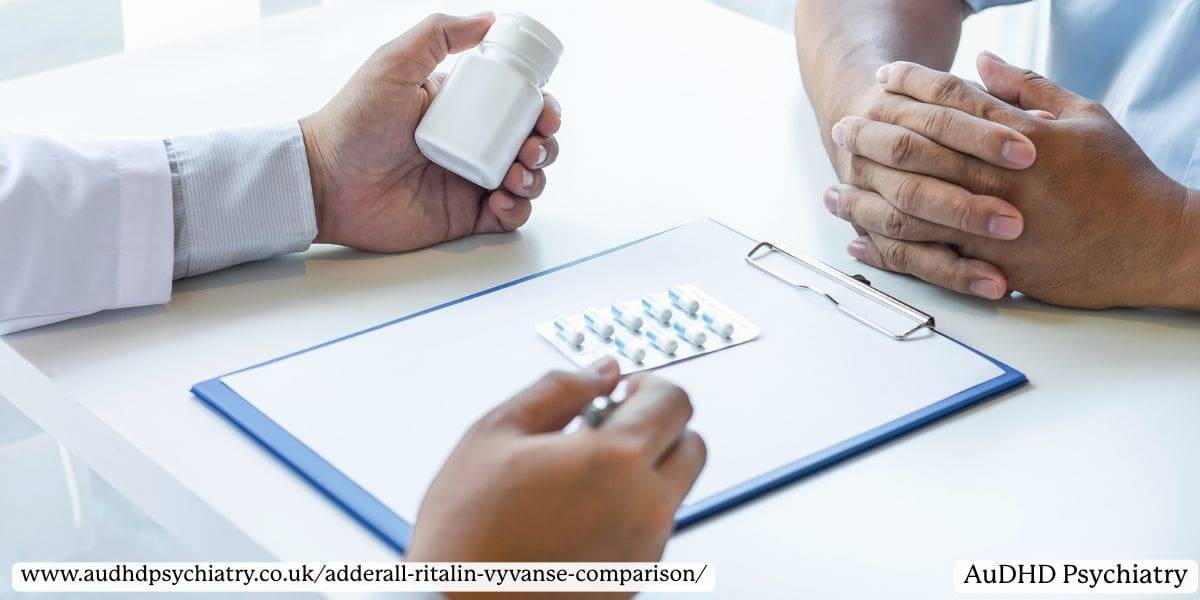
Access Through NHS or Private Prescription
ADHD medication is available through either the NHS or private clinics:
- NHS pathway: Usually involves a longer waiting time for diagnosis and follow-up appointments
- Private pathway: Offers faster access, broader medication choices, and flexible review schedules
There is an ongoing shortage of ADHD medication in the UK, which is important to discuss with your healthcare provider, in case you may need alternatives and take note of availability. Cost, insurance coverage, and generic availability will vary depending on whether you’re under NHS care or seeing a private provider. For more details on these differences, read our guide on the NHS vs Private ADHD Assessment Guide.
What Patients Say: Real-World ADHD Medication Experiences
Clinical data is essential, but so are lived experiences. While everyone reacts differently, certain trends emerge in patient feedback about Adderall, Ritalin, and Vyvanse.
User Reviews and Feedback
- Adderall users often report sharp focus and energy boosts but note crashes, jitters, or emotional irritability as side effects. Short-acting, fast-onset symptom relief is also provided by dexamfetamine, the Adderall alternative prescribed in the UK.
- Elvanse (Vyvanse) is praised for its steady release and fewer mood swings but may cause appetite loss or make sleep harder to manage.
- Ritalin users appreciate the flexibility of short-acting doses, though some mention a rollercoaster effect throughout the day.
Switching Medications
Many patients try more than one medication over time. A person may start on Ritalin, then switch to Concerta, and eventually land on Vyvanse once they understand their side effect profile and daily needs. Open communication with a doctor, tracking symptoms, and understanding how different delivery methods affect your lifestyle are critical.
How to Save Money on ADHD Medications
ADHD medication can be expensive, especially if you’re going the private route or using non-generic options. In the UK, NHS prescriptions are capped, but private prescriptions may vary widely in cost.
Strategies to Reduce Costs
- Request generic versions when available (e.g. methylphenidate instead of branded Ritalin or Concerta)
- Use NHS prescriptions where possible to benefit from the capped prescription fee
- Check private insurance coverage for outpatient psychiatric care or medication reimbursement
- Split long-acting doses under clinical guidance to reduce usage
- Ask about patient assistance programmes (some private clinics offer discounts or bundle follow-ups with prescriptions)
Speak with your clinician about your budget. They may be able to recommend options with similar efficacy but better affordability.
Final Takeaways: Key Differences Between ADHD Medications
Choosing between Adderall, Ritalin, and Vyvanse depends on multiple factors: symptom type, daily routine, side effect response, and access options. Each has distinct benefits, whether it’s Ritalin’s fast action, Adderall’s strong efficacy, or Vyvanse’s long, smooth release.
Remember: before starting or switching any ADHD treatment, speak to a qualified healthcare provider to discuss your medical history, goals, and options. If you need professional guidance to find the right treatment, book an ADHD assessment today with our team of experts. We’ll be happy to help you figure out the right treatment to help you or your loved one manage ADHD better.

